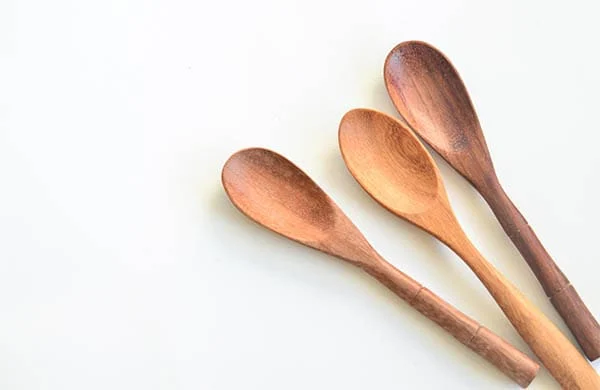Randomly finding a spoon along your travels can certainly grab your attention! And, it’s actually a very good thing to find!
As I sit here writing with my morning coffee, I can’t help but admire the spoon that stirred it. It’s a simple utensil, but its curves and lines are both practical and beautiful.
What is it about spoons that speak to us on a spiritual level? Is it because they remind us of simplicity and sustenance? Or the comfort of eating a nice warm and delicious bowl of soup?
Or, could there be something more to this everyday object? In this blog post, we’ll explore the spiritual meaning of spoons and see what we can learn from them. So, let’s get started.
Spoon Spiritual Meaning And Symbolism
Before we get started into what it means to find a spoon, let’s explore the symbolism of the spoon itself.
The spoon has been around for thousands of years. Mostly made out of wood, a spoon made out of silver or gold was a considered the ultimate status symbol. As a result, spoons still have an association with wealth and abundance.
Of course, that all changed when plastic spoons came out – check out this article for more insight. Still, regardless of the material your spoon is made out of the symbolism remains the same. You can expect abundance!

In some Native American tribes, the spoon is a symbol of unity and community. The spoon also symbolizes nurturing and abundance. In many cultures, the act of sharing a meal is seen as a sacred act of giving and receiving.
When we share food from a common bowl, we are symbolically sharing our life force with one another. In this way, the spoon reminds us of our interconnectedness and the need to care for one another.
So, whether we realize it or not, every time we sit down to eat, we are participating in a sacred ritual that has been practiced for centuries.
The Spoon And The Moon
Did you know that finding a spoon can represent abundance and support in your life because of its association with the moon?
The rounded shape of the spoon has long been associated with the food of course. But, it also has an association with the moon due to its shape, and thus femininity. And, in many cultures, the moon is seen as a symbol of fertility and abundance.
But, it doesn’t end there.

The bowl of the spoon represents the feminine principle, while the handle represents the masculine principle. When these two principles are combined, they represent the harmony of the universe.Therefore, finding a spoon can suggest that you are about to experience a period of abundance and balance in your life.
The handle of the spoon also represents support. It’s a reminder that you are not alone and that you have people in your life who will help and support you through anything.
So, if you find a spoon, take it as a sign that good things are on their way to you. Embrace the abundance and support that is coming your way!
Also Read: Exploring the Meaning of Broken Bowls: A Look at Symbolism and Tradition
Finding A Spoon Spiritual Meaning
Finding a spoon is overall a positive omen to receive. Here’s the main things to keep in mind when you find one.
- The universe is supporting you.
- Things are coming into balance.
- Expect abundance and prosperity.
- Comfort and sustenance is coming soon.
- You might possibly receive inheritance – especially if you find a silver spoon.
- An overall satisfaction with life is on the horizon.
- You will be successful.
Finding a Spoon and Anna Daanam – Hinduism Meaning
In Hinduism, finding a spoon holds spiritual significance as it connects to the concept of anna daanam, which translates to the act of offering food to others.
This practice is considered a form of service and an expression of compassion and generosity towards those who are in need.
The spoon, as a utensil used for eating and serving food, symbolizes nourishment and sustenance.
It represents the basic necessity of food and the vital role it plays in sustaining life.
In Hindu philosophy, food is seen as a gift from the divine, and offering it to others is considered a sacred act.
Anna daanam is deeply rooted in Hindu culture and traditions.
It is believed that providing food to those who are hungry or less fortunate is a way of serving God and expressing gratitude for the abundance one has received.
This act of selfless giving is considered virtuous and spiritually uplifting.
By finding a spoon, it can serve as a reminder of the importance of anna daanam and the values associated with it.
It encourages individuals to cultivate a compassionate mindset and engage in acts of kindness and charity. It reminds them of their responsibility to help alleviate hunger and provide sustenance to those in need.
The Spoon of Blessings – Celtic Tradition
In Celtic culture and folklore, there is a belief that leaving a spoon on a newlywed couple’s doorstep can bring good luck and blessings to their marriage.
When the couple finds the spoon at their doorstep, it becomes a powerful symbol of the positive energy and well-wishes bestowed upon their union.
- By finding a spoon, the couple is being gifted with the promise of always having enough to eat and enjoy a prosperous life together.
- It symbolizes the hope that their union will be filled with fulfillment, both in the material and emotional aspects of their lives.
- The act of finding a spoon in this context can also be seen as a divine sign or synchronicity, indicating that the couple’s union is blessed and supported by the spiritual realm.
- It signifies that their marriage is blessed with the qualities represented by the spoon, such as wisdom, unity, and the ability to nourish each other’s needs.
Furthermore, the spoon in Celtic culture is also associated with the idea of sharing and hospitality.
By leaving a spoon on the doorstep, it signifies the community’s support and well-wishes for the newlyweds.
It represents the idea that their union is not just a private affair but also a celebration and connection with the larger community.
The Symbolism of Begging Spoon

In Buddhism, the act of using a specific spoon called a “begging spoon” during alms rounds holds spiritual significance.
This practice is primarily observed by Buddhist monks who rely on alms as their means of nourishment.
During alms rounds, monks walk through their community, carrying their begging bowls and the begging spoon.
They rely on the generosity of the community to provide them with food for their sustenance.
The spoon is used to collect the food offerings given by the laypeople.
By using a simple spoon, often made of wood or metal, the monks symbolize their commitment to leading a humble and unattached life.
It represents their renunciation of material possessions and their willingness to accept the bare necessities provided by the community.
Monks are taught to receive alms graciously without preference or desire, regardless of the quality or quantity of the food offered.
It serves as a reminder of the impermanence of material possessions and cultivates qualities of humility, contentment, and gratitude within the monastic community.








